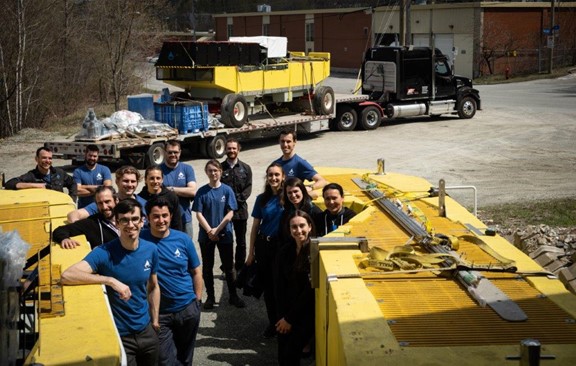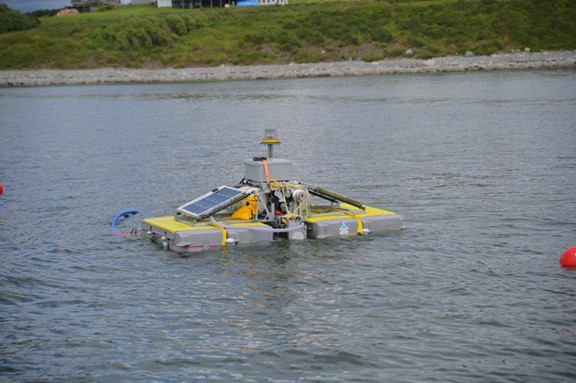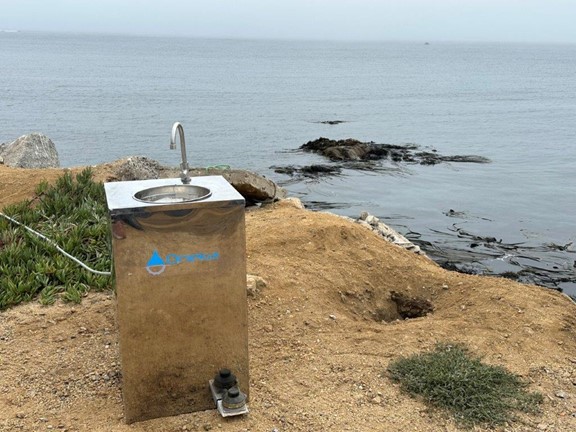
Oneka Technologies: Transforming seawater into drinking water
The business tackles water shortages by using wave movement to desalinate seawater.
From: DEC - March 20, 2024
Summary |
|---|
|
Business: Oneka Technologies |
In the world of clean tech, a Sherbrooke business shines like a beacon as it combines innovation and seawater desalination. Founded in 2015 by engineer Dragan Tutic, Oneka Technologies transforms seawater into freshwater, thereby helping communities facing water shortages. Here is how this business is tackling climate change.

Genesis
A simple question can give rise to extraordinary projects. Dragan had the idea to exploit wave movement to desalinate seawater, following a trip to Corsica in 2012. “As I observed the arid landscapes on this island, I asked myself where the drinking water came from. When I learned that it came mostly from water tables, I said to myself it would be interesting to use the ocean more. I knew that traditional desalination methods were costly and polluting. When I returned home, I began to look at how to desalinate seawater in a sustainable way.” In 2014, the Université de Sherbrooke mechanical engineering student tested an initial desalination unit as part of a university project.In 2015, the young engineer travelled the world, and this convinced him of the need to tackle drinking water supply problems typical of coastal areas. “Drinking water is unevenly distributed on the earth and is difficult to transport,” he indicates. “And yet, needs will increase due to population growth and climate change. Communities are facing significant supply difficulties.” Concerned by this growing issue, Dragan went further with his reading and surrounded himself with a solid team to design a modular system that would not depend on fossil energy, as traditional desalination technologies do.
An innovative process

This approach gave rise to a revolutionary technology: seawater desalination buoys that run on kinetic wave energy. These buoys transform wave movement into energy that pressurizes the water and then purifies it through inverse osmosis membranes. The desalinated water is then brought to the coast through an underwater pipe and stored in reservoirs, ready to be distributed for human consumption, irrigation, or industrial use. Thanks to the modular nature of Oneka’s solution, the brine is returned to the ocean through several discharge points, where wave power quickly disperses it.
“The financial support from Canada Economic Development for Quebec Regions represented a major boost for Oneka Technologies. This contribution enabled us to accelerate the development of the technology, improve our systems, and implement operational solutions,” Dragan gladly relates. “The synergy between innovative businesses and support organizations in the government thus creates a favourable ecosystem for growth and success among entrepreneurs.”
The positive impact on the environment…and on humans
At the heart of Oneka Technologies’ mission resides a deep commitment to sustainable development. Its desalination method uses a renewable energy source, emits no greenhouse gases, and minimizes the negative effects on marine ecosystems.

After developing its concept over nearly ten years, Oneka Technologies has undertaken its marketing phase. Today, the team has demonstration units in Florida, in the U.S., and along the coast of Algarrobo, in Chile, and is eyeing the Caribbean market, so many regions where water shortages are a glaring problem. An initial buoy will soon be operating at Fort Bragg in California, where the drought in recent years has led to the need to diversify freshwater sources.
In 2023, the start-up also opened an office at the Centre for Ocean Ventures and Entrepreneurship in Dartmouth, Nova Scotia. Thanks to this homebase in the Maritimes, the business is part of a community working to develop ocean-based innovations. Among other projects, the business has designed small desalination units to aid populations deprived of water following natural catastrophes such as hurricanes or earthquakes.
The Sherbrooke SME has thus become a model for entrepreneurs seeking innovative solutions to the 21 st century’s climate challenges.